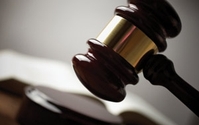Judge Rules Google Can't Edit Record Of Public Hearing
- by Wendy Davis @wendyndavis, August 7, 2014
 Siding with a
group of news organizations, a federal judge on Wednesday rejected Google's attempt to edit the publicly available transcript of a critical hearing in a lawsuit about Gmail ads.
Siding with a
group of news organizations, a federal judge on Wednesday rejected Google's attempt to edit the publicly available transcript of a critical hearing in a lawsuit about Gmail ads. U.S. District Court Judge Lucy Koh in San Jose, Calif., also partially granted the news organizations' request to unseal other materials in the case, ruling that Google hadn't shown a need for secrecy.
“The court is mindful of balancing the potential effects of disclosure to Google against the public’s need to understand the proceedings and the court’s rulings,” Koh wrote in a 16-page decision.
Specifically, she ruled that material dealing with Gmail's technical operations could be sealed, if making that data available could create a security risk or pose a competitive threat. But Koh said that other documents -- including evidence about the types of information Google includes in its user profiles -- should be part of the public record.
The ruling stemmed from a lawsuit centering on allegations that Google violated privacy laws by scanning people's Gmail messages for advertising purposes. The consumers who brought the case settled the matter after Koh ruled that they could proceed as individuals, but not on behalf of a class of all Gmail users.
Several months before the case was resolved, The New York Times Company, Atlantic Media, Forbes and other news organizations moved to intervene in the lawsuit. The news organizations asked Koh to unseal thousands of pages of records that were filed in the course of the litigation. Several weeks, ago the news organizations renewed their request.
The news companies also were battling Google about whether the company was entitled to seal portions of a hearing that was held on Feb. 27 in open court.
Shortly after that February hearing -- which was covered by numerous news outlets -- Google filed a motion to edit the transcript. The company said at the time that the plaintiffs' lawyers “disclosed confidential and proprietary information about Google’s Gmail systems” at the hearing.
“While Google was willing to permit the open discussion of this information in a live hearing, creating a permanent written record containing the sealable information ... would cause Google and its users significant harm,” the company wrote in its motion papers.
Koh wrote on Monday that Google couldn't retroactively seal the hearing. “Where, as here, the parties did not request closure of the courtroom ... the court will not permit an ex post facto [deletion] of statements made in open court in the transcript,” she wrote.



It just shows how ignorant I am. I always thought that by signing up to Google Mail, users would willingly allow Google to scan their emails for profiling & advertising data — a reason why in my country almost all lawyers do *not* use Gmail for their email, thus allowing smaller companies providing encrypted mailboxes and secure communications to thrive — even if it's just because lawyers, doctors, and journalists are self-conscious about their privacy.
I mean, what is Google afraid of? That 'all the world' knows they are scanning our emails and using it for profiling data? Uh... doesn't the world know that already? How would a public transcript of that 'cause Google and its users significant harm'? It would be the same thing as claiming in a public hearing that the sun is yellow, and fearing that a transcript about such a fact becomes public...
But then again, maybe Google's terms of service are so convoluted and difficult to understand that people actually still believe that Google does NOT scan their emails... and such a 'revelation' might 'hurt' them.
Right. Some people still believe in Santa Claus, too, and revealing that Santa doesn't actually exist doesn't hurt anybody — we get over it when we're kids, after all. We can certainly survive being 'hurt' because Google has always scanned our emails.